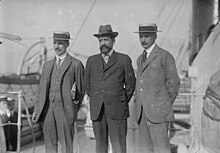Basil Phillott Blackett
| Basil Phillott Blackett | |
|---|---|

Basil Blackett, Octave Homberg and Ernest Mallet in 1915
|
|
| Born |
January 8, 1882 Calcutta, India |
| Died | August 15, 1935 (aged 53) Marburg, Germany |
| Education |
Marlborough College University College, Oxford |
| Parent(s) | William Blackett Grace Phillott |
Sir Basil Phillott Blackett KCB KCSI (8 January 1882 – 15 August 1935) was a British civil servant and expert on international finance.
Blackett was the eldest son of Rev. William Blackett, a missionary and educationalist in India and his wife Grace Phillott. He was born in Calcutta and educated at Marlborough College. At Marlborough, he injured his leg badly, and while recuperating, spent some time in Germany and acquired a lifelong interest in the country. He then went to University College, Oxford on a scholarship.
Basil Blackett entered the civil service in 1904 and chose the Treasury instead of the Indian service as he had originally intended. He was in the financial division, and was secretary to the Royal Commission on Indian Finance and Currency (1913–1914), when World War I broke out. He went to America for the first time in October 1914 in connection with foreign exchange matters, and was awarded the CB in the 1915 New Year Honours. He was a member of the Anglo-French Financial Commission which went to America in 1915, so that when the United States entered the war in 1917, he was seen as the natural choice to represent HM Treasury in Washington. He held this post from 1917 to 1919, and on his return in 1919, he became First Controller of Finance at the Treasury. He was awarded the KCB in 1921.
In 1922 he went to India as finance member of the Viceroy's council. Over the next five years he was seen to be an outstanding financial administrator and within a year he had initiated and put through three major financial reforms. He put the Indian railways on an independent footing, concentrated the charges for the public debt into a statutory sinking fund; and set up a conference bringing together the eight provincial finance members for the first time to compare and co-ordinate their problem.. He became involved in political questions and applied the same principles of conference and co-ordination to these. He taught himself the art of debating, although not a natural, and came to lead the legislative assembly, in which he introduced six successive budgets. He was awarded KCSI in 1926 in recognition of his achievements.
...
Wikipedia
